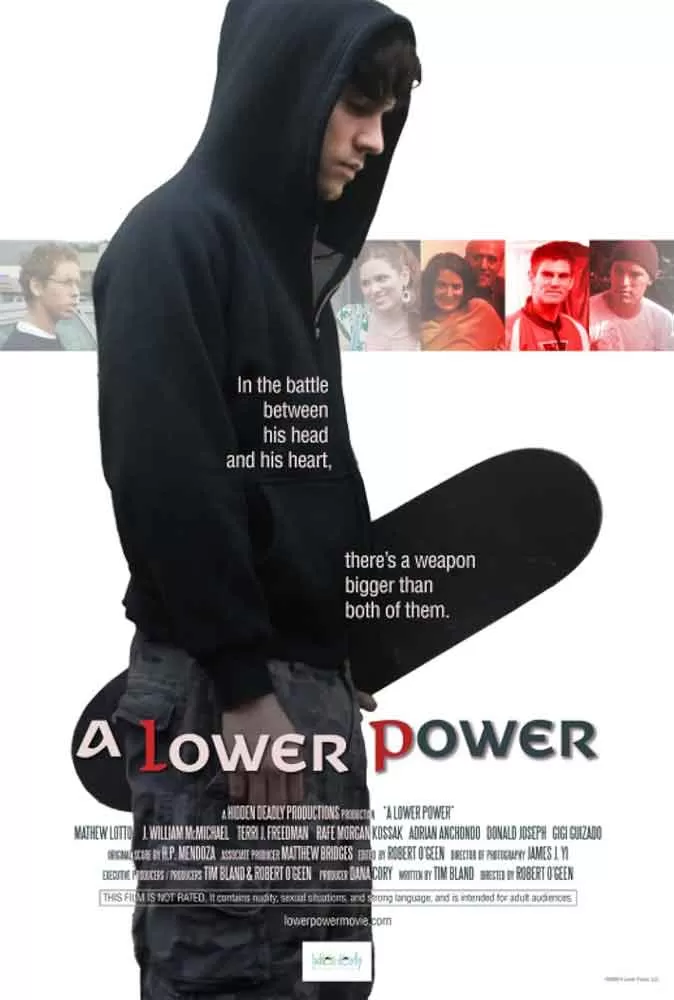In a world overflowing with queer films that often swing between overt humor and deep, tragic reflection, A Lower Power (2009) chooses an audacious, less-traveled path. This darkly comedic, emotionally raw story probes the complexity of identity, repression, and the ongoing internal struggle between faith, yearning, and authenticity. Penned and helmed by Robert O’Geen, this independent gem offers a low-budget, yet highly charged, character-driven narrative. It’s a story that won’t resonate with everyone, but it leaves an impression that lingers long after the credits roll.
Plot Breakdown in A Lower Power (2009)
The plot of A Lower Power (2009) revolves around Tibodoa, a young gay man living in San Francisco, who desperately seeks to break free from the hedonistic lifestyle that his parents embrace. He strives to lead a life grounded in conservative and religious principles, yet the internal clash between the constraints he imposes on himself and the undeniable pull of his desires soon shatters both his relationships and his perception of reality.
His existence becomes a tightrope walk — one moment, he’s attempting to maintain celibacy and engage in prayer, the next, he’s engulfed in passionate, almost fantastical dreams of an unattainable “perfect man.” As the lines between self-denial and longing blur, Tibodoa’s journey turns into a surreal, disjointed dance between control and pandemonium.
“¡Papá!” — shouted in a mix of disbelief and anger, when confronted with his father’s unfiltered and unapologetically libertine worldview.
Between Humor and Unease in A Lower Power
A Lower Power (2009) doesn’t make for comfortable viewing. It’s awkward, often unsettling, and confrontational; yet it’s painfully honest in its portrayal. The film doesn’t serve up easy answers or neatly packaged moral conclusions. Instead, it drags the viewer through the mud alongside Tibodoa, letting you experience his confusion, repression, and desperate yearning for belonging.
The tone shifts rapidly between humor and discomfort, often in the same scene. At one moment, you’re laughing at a ludicrous encounter, only to find yourself holding your breath as Tibodoa sinks deeper into denial. This emotional whiplash is precisely what gives the film its edge, setting it apart from others.
Tibodoa and His Influencers
Mathew Lotto’s portrayal of Tibodoa is a masterpiece of introspection. With a delicate intensity, Lotto carries the film, bringing to life a character who simultaneously despises and craves his own identity. The supporting cast, including William McMichael, Terri J. Freedman, and Rafe Morgan Kossak, provide added depth, playing characters that seem like exaggerated reflections of the world Tibodoa is either resisting or secretly yearning for.
The relationship between Tibodoa and his father is especially compelling. Their interactions go beyond mere confrontation — they reflect a broader cultural divide, one between fear and liberation, desire and dogma. This father-son dynamic illustrates the generational split within the LGBTQ+ community.
A Lower Power (2009) – A Raw Take on Repression
Robert O’Geen’s direction feels personal and unrefined, but that’s exactly what gives it power. While this is a low-budget film, its rough edges amplify the raw emotional themes at its core. The visuals, often minimalist, add to the voyeuristic tension, giving the film a documentary-like realism that keeps you on edge.
The Toll of Self-Denial
At the heart of A Lower Power (2009) lies an exploration of the consequences of self-repression. It raises the question: what happens when someone denies their true self in the name of morality, family, or an assumed “higher power”? How much harm can be inflicted, both on oneself and others, by refusing to embrace who you truly are?
This isn’t a movie that presents easy solutions. Rather, it challenges the viewer to face uncomfortable truths and navigate a sea of uncertainty — and that is exactly what gives it its power. It serves as a mirror to anyone who has ever felt torn between who they are and the person they are expected to be.
Why A Lower Power (2009) Still Resonates
A Lower Power (2009) is messy, uneven, and uncomfortable. But it’s also brave, raw, and profoundly human. It captures something that high-budget, polished studio films often miss: the chaotic, confusing, and contradictory process of coming to terms with your true self — not in theory, but in practice.
This isn’t a film for someone looking for a light, entertaining Friday night flick. It’s for those who appreciate cinema that’s raw, reflective, and honest. If you’re willing to endure the awkwardness, you’ll be rewarded with something rare: a queer narrative that doesn’t strive to please but to genuinely express.






